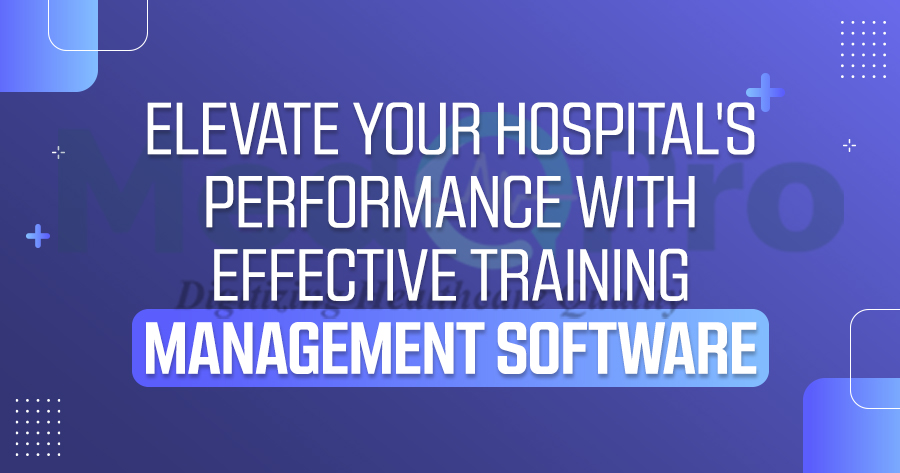In today’s changing healthcare environment, hospitals are under tremendous pressure to provide quality patient care while ensuring efficient operations. A hospital’s workforce development and training have been prepared at a pivotal point in conditions that will make a difference in its success. Good hospital training management ensures the medical staff has the competencies and skills to deliver quality care, minimize medical errors, and enhance patient outcomes.
It is relevant to note that a well-structured hospital training program is one of the strategic investments in the future, not an obligation to meet legal requirements only. In this respect, equipping staff with state-of-the-art industry best practices and advanced technologies enables hospitals to enhance operational efficiency, create a continuous learning and development culture, and ensure patient safety.
The Importance of Hospital Training Management
To achieve organizational excellence, hospital training management is essential. The following are some main advantages:
- Medical errors and unfavorable occurrences are less likely to occur when staff members are adequately trained and able to recognize and manage possible hazards.
- Knowledgeable and competent personnel can offer more empathetic and efficient care, which improves patient experiences.
- Hospitals can streamline procedures, cut waste, and boost output by ensuring staff members possess the required knowledge and abilities.
- To preserve a hospital’s good name and avoid legal trouble, compliance with industry norms and regulations is crucial.
The Role of Hospital Training Software
Many hospital training programs are managed more efficiently using specialist software solutions. Hospital training software simplifies several training-related tasks, such as:
- Course Creation and Management: Training materials, such as online courses, presentations, and tests, may be easily created, edited, and distributed.
- Learner Enrollment and Tracking: To guarantee that training requirements are met, enrollment is automated, and learners’ progress is monitored.
- Assessment and Certification: Conduct online tests and certifications, keeping track of outcomes and providing prompt feedback.
- Analytics and Reporting: Produce thorough training performance reports, pinpoint areas needing development, and show adherence to legal requirements.
- Integration with HR Systems: Easily incorporate training data into HR systems like performance management and payroll.
Key Features of Hospital Training Software
The following characteristics should be included in a robust hospital training software solution including Customization, Accessibility, Scalability and more. Firstly, the customization is the capacity to modify the program to fit a hospital’s unique requirements regarding workflows, reporting formats, and course material. Secondly, with the accessibility, hospital staff members can learn quickly with simple access to training materials on any device. Thirdly, ensure that the hospital training management program has the ability to learn while on the go by supporting mobile devices. Fourthly, scalability, the capacity to grow with the hospital to meet its expanding needs.
Implementing a Successful Hospital Training Program
The following actions should be taken into consideration for a good hospital training program:
- Needs Evaluation: Determine your employees’ training needs in light of their job duties, applicable laws, and current trends.
- Create a Training Schedule: Make a thorough training plan that includes the goals, the intended audience, the material, the delivery strategies, and the evaluation standards.
- Choose the Right Training Techniques: Select the most efficient training techniques, including in-person instruction, virtual learning, simulations, and hands-on training.
- Assess and Enhance: Keep a close eye on the success of your training initiatives to spot opportunities for development and implement the required changes.
Healthcare organizations can attain long-term success, improved operational efficiency, and improved patient care through specialist software and excellent hospital training management. Finding the right hospital training software in India will give many benefits into the hospital business and it’s always suggested to check the hospital training software features, compatibility, training facility etc.
In conclusion, a culture of continuous learning, improved operational efficiency, and high-quality patient care all depend on efficient hospital training management. Healthcare businesses may provide their workers with the skills and knowledge they need to tackle the difficulties of the ever-changing healthcare industry by implementing a comprehensive training program and harnessing the potential of hospital training software. A well-designed training program from MedQPro helps the overall prosperity and sustainability of the hospital and improves patient safety and satisfaction. Healthcare businesses can establish themselves as leaders in their industry and offer patients outstanding care by placing a high priority on training and development.


